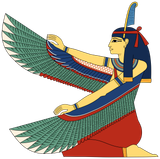Search Results
8/2/2025, 12:36:02 AM
>>511988935
Thus, also, is life given to the peaceful and death given to one who violates the Law. And thus were made every work and all crafts, the action of the arms and hands, the motion of the legs, the movement of every member of the body, according to the command which is conceived by the heart and mind and brought forth by the tongue, and which creates the usefulness and action of everything.
It is said of Ptah (Ra) then, He is He who made all and created the divine powers. He is Ta-tenen (the Risen Land) who produced the divine powers and from whom everything came forth — food and provisions, divine offerings and every good thing. Thus, it was recognized and understood that He is the mightiest of all divine powers. And after He had created all things and all the divine utterances, Ptah (Ra) was pleased and rested.
Thus, also, is life given to the peaceful and death given to one who violates the Law. And thus were made every work and all crafts, the action of the arms and hands, the motion of the legs, the movement of every member of the body, according to the command which is conceived by the heart and mind and brought forth by the tongue, and which creates the usefulness and action of everything.
It is said of Ptah (Ra) then, He is He who made all and created the divine powers. He is Ta-tenen (the Risen Land) who produced the divine powers and from whom everything came forth — food and provisions, divine offerings and every good thing. Thus, it was recognized and understood that He is the mightiest of all divine powers. And after He had created all things and all the divine utterances, Ptah (Ra) was pleased and rested.
!!P38zFLDUYUh/x/40835172#40836775
8/1/2025, 10:24:30 PM
>>40836764
Finally, it is of value to note that the Ma'atian ideal condemned coerced labor as clearly and often attested to in the texts. In the Old Kingdom, in the autobiography of the Master-builder, Nekhebu we find a clear disavowal of coerced labor. As part of his declaration of virtues, Nekhebu says: “Never did I beat a man so that he fell by my hand. Never did I enslave any people there. As for any persons with whom I had arguments, it was I who pacified them” (Urk I, 217.4-7). Likewise, the nomarch Henku (Urk I, 77.4) disavows coerced labor and sexual exploitation of women saying, “No daughter of yours was ever made to do forced labor (or enslaved) … her arms against me.” Moreover, the nomarch Khety notes proudly that he also did not use forced labor in his building and development of the town of Siut. He says, “I gave a gift to this town without use of corvée labor from Upper Egypt or draft labor from Lower Egypt.”
Such declarations are the Ma'atian ideal and certainly do not signify the total absence of the use of coerced labor, no more than the U.S. Constitution or any other legal or moral document does. But the texts do give us evidence of the Ma'atian ideal on this issue, and joined to historical evidence cited above, contribute to a more balanced picture of Kemetic society and tend to undermine the distorted religious view of ancient Egypt as a mythic “land of bondage.”
Finally, it is of value to note that the Ma'atian ideal condemned coerced labor as clearly and often attested to in the texts. In the Old Kingdom, in the autobiography of the Master-builder, Nekhebu we find a clear disavowal of coerced labor. As part of his declaration of virtues, Nekhebu says: “Never did I beat a man so that he fell by my hand. Never did I enslave any people there. As for any persons with whom I had arguments, it was I who pacified them” (Urk I, 217.4-7). Likewise, the nomarch Henku (Urk I, 77.4) disavows coerced labor and sexual exploitation of women saying, “No daughter of yours was ever made to do forced labor (or enslaved) … her arms against me.” Moreover, the nomarch Khety notes proudly that he also did not use forced labor in his building and development of the town of Siut. He says, “I gave a gift to this town without use of corvée labor from Upper Egypt or draft labor from Lower Egypt.”
Such declarations are the Ma'atian ideal and certainly do not signify the total absence of the use of coerced labor, no more than the U.S. Constitution or any other legal or moral document does. But the texts do give us evidence of the Ma'atian ideal on this issue, and joined to historical evidence cited above, contribute to a more balanced picture of Kemetic society and tend to undermine the distorted religious view of ancient Egypt as a mythic “land of bondage.”
!!P38zFLDUYUh/x/40800433#40800441
7/26/2025, 7:10:01 PM
Page 1

